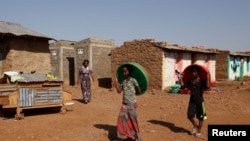Humanitarian organizations are sounding the alarm on the safety of Eritrean refugees in Ethiopia’s Tigray region as reports of attacks and forced deportations emerge.
Approximately 96,000 Eritrean refugees lived in four camps in Tigray prior to the conflict which erupted in November. Many fled the violence to Sudan or to other parts of the country including the capital Addis Ababa.
According to Refugees International, an independent advocacy group, Eritreans are being rounded up and returned to war-torn Tigray or are being deported to their homeland.
“There’s a lot of concern that Eritreans are being forced back to places where they would be in danger,” said Sarah Miller, a senior fellow with Refugees International. “Whether that’s inside Ethiopia, including an active conflict zone in Tigray, or even back into Eritrea where they’ve fled, and that would be a huge violation of international law.”
Miller told VOA the reports are coming in from refugees, family members and NGOs that are active in Ethiopia.
Stijn Vercruysse, a reporter with Belgium's VRT NWS, spoke to Eritrean refugees on the road to Shiraro after fleeing Shimelba Refugee Camp in Ethiopia's Tigray region.
Vercruysse told VOA that refugees said some people in the camps were being forcibly returned to Eritrea. Vercruysse said one refugee said he witnessed armed men forcing people into vehicles.
Chris Melzer, UNHCR's emergency response team in Ethiopia, told VOA via email that his organization has not yet been granted access to return to the four refugee camps in Tigray but food distribution has resumed at two of the camps. He too is concerned about alleged violence against refugees.
“We are aware of many stories about killings and abductions from the camps," he said. "If confirmed, these actions would constitute a major violation of international law. But we are not in the position that we can confirm these reports now."
The issue has garnered the attention of U.S. officials. In a joint statement, U.S. Sen. Cory Booker (D-NJ) and Sen. Todd Young (R-IN) demanded that all parties in the conflict protect civilians as is required under international law and allow those fleeing violence to do so.
“We are deeply concerned by reports of Eritrean refugees in Tigray being killed, abducted and forcibly returned to Eritrea by Eritrean forces, as well as disturbing reports that some trying to reach safer areas are being prevented from leaving,” the senators said in a statement.
Recent reports suggest that Eritrean soldiers have been involved in the Tigray region conflict. Five diplomats pointed to evidence of soldiers on the ground citing satellite images, intercepted communications and anecdotal reports from Tigray region, according to Reuters.
“We are aware of credible reports of Eritrean military involvement in Tigray and view this as a grave development," a State Department spokesperson told VOA. "We urge that any such troops be withdrawn immediately. We are also aware of reports of human rights violations and abuses in the region. All parties must respect human rights and international humanitarian law.
"We and other international partners continue to urge an independent investigation of the reports and accountability for those found responsible," the spokesman said. "We continue to urge all parties to restore peace, protect civilians — including refugees — and allow unhindered humanitarian access in Tigray.”
But the Eritrean minister of information, Yemane Gebremeskel, said the United Nations is responsible for the difficulties of Eritrean refugees in the Tigray region.
“For almost two decades now, the UNHCR abused its institutional mandate and networks to become the principal conduit for a malicious policy of ‘strategic depopulation’ against Eritrea,” Yemane tweeted earlier this month. “The UNHCR seems bent on ramping up its irresponsible acts to indulge in incessant smear campaigns.”
For almost two decades now, the UNHCR abused its institutional mandate & networks to become the principal conduit for a malicious policy of "strategic depopulation" against Eritrea. The UNHCR seems bent on ramping up its irresponsible acts to indulge in incessant smear campaigns
— Yemane G. Meskel (@hawelti) December 2, 2020
Redwan Hussien, a spokesman for the Ethiopian government's task force in Tigray, said that no one is allowed to have unfettered access to the region without the government’s permission after a U.N. team was fired on by federal forces.
“They were told in some areas they were not supposed to move,” he told reporters during a press conference in early December. “But they indulged themselves in a kind of adventurous expedition.”
Refugee International’s Miller said the conditions in refugee camps in Tigray have become dire and there are shortages of necessities.
“The U.N. has been reporting very low, low supply of food, medical supplies, fuel, all of the concerns that we've had," she said. "There's very little resources that refugees would have to survive which is why we're seeing so many starting to leave the camps."
Miller said those fleeing on foot should be allowed to do so safely.
“There is a right to flee for your life no matter where you are and the concern is that they are being pushed back, forced back into those camps into an active conflict zone or as I said back into Eritrea which would be worrisome,” she said.
Cindy Saine contributed to this report.




